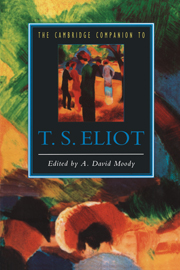Book contents
- Frontmatter
- 1 Where is the real T. S. Eliot? or, The Life of the Poet
- 2 Eliot as a product of America
- 3 Eliot as philosopher
- 4 T. S. Eliot's critical program
- 5 The social critic and his discontents
- 6 Religion, literature, and society in the work of T. S. Eliot
- 7 “England and nowhere”
- 8 Early poems
- 9 Improper desire
- 10 Ash-Wednesday
- 11 Four Quartets
- 12 Pereira and after
- 13 “Mature poets steal”
- 14 Eliot's impact on twentieth-century Anglo-American poetry
- 15 Tradition and T. S. Eliot
- 16 Eliot
- 17 Eliot studies
- A Select Booklist
- Index
13 - “Mature poets steal”
Eliot's allusive practice
Published online by Cambridge University Press: 28 May 2006
- Frontmatter
- 1 Where is the real T. S. Eliot? or, The Life of the Poet
- 2 Eliot as a product of America
- 3 Eliot as philosopher
- 4 T. S. Eliot's critical program
- 5 The social critic and his discontents
- 6 Religion, literature, and society in the work of T. S. Eliot
- 7 “England and nowhere”
- 8 Early poems
- 9 Improper desire
- 10 Ash-Wednesday
- 11 Four Quartets
- 12 Pereira and after
- 13 “Mature poets steal”
- 14 Eliot's impact on twentieth-century Anglo-American poetry
- 15 Tradition and T. S. Eliot
- 16 Eliot
- 17 Eliot studies
- A Select Booklist
- Index
Summary
“The borrowed jewels he has set in its head do not make Mr. Eliot's toad the more prepossessing”: so wrote an early reviewer of The Waste Land, affronted by the bold allusions from which Eliot's poetry was built. Those allusions, reinforced by Eliot's own notes to The Waste Land, have never ceased to affront; even today they account for Eliot's still formidable reputation as a “difficult” poet, and several generations of sourcehunting critics have reinforced that impression. Eliot sometimes played this game himself (“Immature poets imitate,” he quipped early in his career, “mature poets steal” [SE [1950], p. 182]), but other times he was dismayed that readers found the surface difficulties of his poems prohibiting. And while it's true that knowledge of Eliot's models and sources does enrich a reading of his poetry, it is ultimately more important to understand the nature of Eliot's allusive practice - to ask not only what is the source? but why does Eliot allude? and how do we experience the allusion?
- Type
- Chapter
- Information
- The Cambridge Companion to T. S. Eliot , pp. 176 - 188Publisher: Cambridge University PressPrint publication year: 1994
- 7
- Cited by

